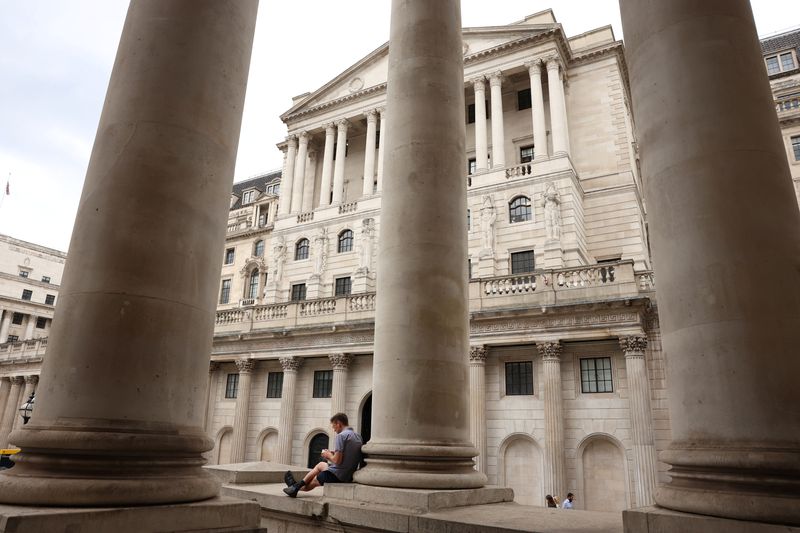By Andy Bruce, Suban Abdulla and David Milliken
LONDON (Reuters) – The Bank of England cut interest rates on Thursday for only the second time since 2020 and said future reductions were likely to be gradual, as it saw the new government’s first budget leading to higher inflation and economic growth.
The Monetary Policy Committee voted 8-1 to cut interest rates to 4.75% from 5%, a stronger majority than expectations in a Reuters poll for a 7-2 vote in favour of a cut. Catherine Mann dissented, preferring to keep rates on hold.
Sterling rose by half a cent against the U.S. dollar. British government bond prices rose after initially edging down.
“We need to make sure inflation stays close to target, so we can’t cut interest rates too quickly or by too much,” BoE Governor Andrew Bailey said in a statement.
“But if the economy evolves as we expect it’s likely that interest rates will continue to fall gradually from here,” he added, broadly echoing his language after September’s meeting.
The BoE predicted that Labour Party finance minister Rachel Reeves’ budget announced last week – which entails big increases in tax, spending and borrowing – would boost the size of Britain’s economy by around 0.75% next year but barely improve annual growth rates in two or three years’ time.
Her plan was likely to add just under half a percentage point to the rate of inflation at its peak in just over two years’ time, the BoE said, causing inflation to take a year longer to return sustainably to its 2% target.
Bailey nevertheless said he did not think the path of interest rates would be “particularly different”.
Reeves said families would welcome the BoE’s rate cut.
The BoE did not refer in its statement to Donald Trump’s U.S. election victory, which has prompted a big reduction in bets that the Federal Reserve will cut rates aggressively.
Asked by reporters about the implications for the BoE from the election, Bailey said the British central bank would watch for Trump’s trade policies – he has proposed sweeping import tariffs – but it was too early to draw conclusions.
“Even though interest rates have further to fall, the upward pressure on inflation from the budget and growing global risks, including possible new U.S. tariffs, could mean that policy is loosened more modestly than many anticipated,” Suren Thiru, economics director at accountancy body ICAEW, said.
The BoE’s cautious language on future interest rate cuts was similar to previous months, in keeping with investors’ view that it is likely to cut interest rates more slowly than the European Central Bank.
The Fed is expected to reduce its benchmark policy rate by quarter of a percentage point later on Thursday.
After the BoE’s rate cut, financial markets priced only around two interest rate cuts from the BoE in 2025, compared with between two and three beforehand and down from around four before the budget.
HIGHER INFLATION AFTER BUDGET
The BoE said inflation was likely to rise to around 2.5% by the end of this year from 1.7% in September and hit 2.7% by the end of next year, before falling gradually below its 2% target by the end of the three-year forecast.
Government decisions to raise the cap on bus fares, hike value-added tax on private school fees and increase employers’ social security contributions were likely to boost inflation.
With the latter measure combining with a 6.7% hike in the national minimum wage, the BoE said employers faced rising costs – although it could not be certain of the overall effect on inflation as employers might respond by sacking staff or accepting lower profits.
Two of Britain’s biggest businesses, BT and Sainsbury (LON:SBRY)’s, said on Thursday that tax changes in the budget would fuel inflation.
Bailey said the BoE’s key gauge of price pressure – inflation in the services sector – remained too high.
“We still need to see services price inflation come down more broadly to keep headline consumer price inflation at the 2% target,” he told reporters at the start of a press conference.
While the BoE downgraded its forecast for average economic growth this year to 1% from 1.25%, reflecting recent revisions to past growth, it raised its forecast for 2025 to 1.5% from 1%.
“This reflects the stronger, and relatively front-loaded, paths for government consumption and investment more than offsetting the impact on growth of higher taxes,” the BoE said.
While the BoE’s forecasts for growth and inflation include the impact of higher spending and taxes, they do not include the effect of a big rise in market borrowing costs since the budget as it set those assumptions beforehand and did not update them.
If now-higher market interest rates were factored in, the outlook for inflation and growth would likely be a bit lower.
The BoE repeated its message that monetary policy would need to stay “restrictive for sufficiently long” to return inflation sustainably to the 2% target.




























